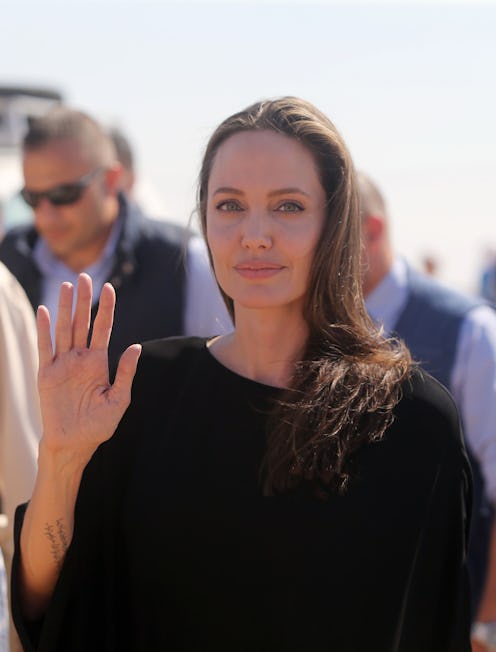Entertainment
Here’s Why Angelina Jolie’s Latest Interview Caused Controversy

On Wednesday, July 26, Vanity Fair published a profile of Angelina Jolie that was, in part, intended to give an up-close look at her work on her latest film, First They Killed My Father. But a passage from Jolie's profile about the casting process for the film sparked criticism. Now, Jolie has responded to the Vanity Fair profile backlash in a statement released on Saturday, in which refuted claims that the film was exploitative.
Jolie's film is a Netflix original based on Loung Ung's memoir of the same title, which depicts her childhood under the violent Khmer Rouge regime in Cambodia. TheVF article noted that casting directors visited orphanages and impoverished schools, and set up a "game" for the children as part of the audition process. According to the Vanity Fair profile,
"In order to find their lead, to play young Loung Ung, the casting directors set up a game, rather disturbing in its realism: they put money on the table and asked the child to think of something she needed the money for, and then to snatch it away. The director would pretend to catch the child, and the child would have to come up with a lie.
Srey Moch, the girl cast in the lead role, was selected through this process.
The description of the casting process was met with immediate backlash. Jolie and producer Rithy Panh issued statements to address the article and claimed the process was misunderstood. Both creators insisted that no children were tricked or mislead.
According to The Huffington Post, Jolie's statement reads,
Every measure was taken to ensure the safety, comfort and well-being of the children on the film starting from the auditions through production to the present. Parents, guardians, partner NGOs whose job it is to care for children, and medical doctors were always on hand everyday, to ensure everyone had all they needed. And above all to make sure that no one was in any way hurt by participating in the recreation of such a painful part of their country’s history.
I am upset that a pretend exercise in an improvisation, from an actual scene in the film, has been written about as if it was a real scenario. The suggestion that real money was taken from a child during an audition is false and upsetting. I would be outraged myself if this had happened.
The point of this film is to bring attention to the horrors children face in war, and to help fight to protect them.
Panh, who is an acclaimed Cambodian documentary filmmaker and a survivor of the Khmer Rouge, reiterated that the casting was done in a humane, sensitive manner.
The producer stated that families' preferences informed the casting, that non-governmental organization guidelines were followed, and that the children understood they were acting out a scene at all times. The filmmaker offered an extensive description of the process in his own separate statement. According to the Huffington Post, Panh's statement reads in part:
The casting was done in the most sensitive way possible. The children were from different backgrounds. Some were underprivileged; others were not. Some were orphans. All of the children were tended to at all times by relatives or carers from the NGOs responsible for them. The production team followed the families’ preferences and the NGO organizations’ guidelines. Some of the auditions took place on the NGOs’ premises.
Ahead of the screen tests, the casting crew showed the children the camera and the sound recording material. It explained to them that they were going to be asked to act out a part: to pretend to steal petty cash or a piece of food left unattended and then get caught in the act. It relates to a real episode from the life of Loung Ung, and a scene in the movie, when she and her siblings were caught by the Khmer Rouge and accused of stealing.
The casting method isn't the only controversy First They Killed My Father has faced. Human Rights Watch's Asia Division criticized Jolie for, according to Vanity Fair, including the actual Cambodian army in the film. The article reads, "Cambodia went all in — closing off Battambang for days, giving the filmmakers permits to land in remote zones, providing them with 500 officials from their actual army to play the Khmer Rouge army."
The Human Rights Watch feels that casting the forces in the film could empower or legitimize their position. Jolie did not address the Human Rights Watch's comments or anything about the reported use of the army in her statement on Saturday. Bustle reached out to Jolie and Netflix for comment on this topic, but did not receive a response at the time of publication..
Vanity Fair released a statement following Jolie and Panh's. The statement, was released on Sunday to ABC and asserted that the article, "clearly describes what happened during the casting process as a 'game' " and "that the filmmakers went to extraordinary lengths to be sensitive in addressing the psychological stresses on the cast and crew that were inevitable in making a movie about the genocide carried out in Cambodia by the Khmer Rouge." Bustle reached out to Vanity Fair, but did not receive a response at the time of publication.
First They Killed My Father is set to be released on Netflix, though it does not yet have an official premiere date. It will first appear at the Toronto International Film Festival in September.